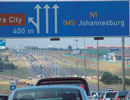

The era of hi-tech is about to hit the traffic management industry – in the form of radiowave-based spotting of vehicles on our highways.
And this will not be limited to large trucks of cash-in-transit vehicles: a nation-wide plan to make this compulsory for all registered vehicles is ready for deployment – motorists will see spotting stations going up on major highways as early as 2008. The technology that will make it possible to achieve this ambitious plan is called radio frequency identification or RFID – and in this case the passive version, opposed to the active RFID tags that are currently used for open-lane tolling.
The idea of putting electronic tags on vehicles is of course not new – GPS-based tracking devices and other varieties of RF tracking have been employed since the ’90s as methods for vehicle recovery. The problem to deploy this onto the complete national fleet has been one of cost: a large percentage of vehicle owners simply cannot afford the several thousand rand at which such devices are going, making it impractical as a measure to be enforced onto all vehicle owners. Even active RFID tags that retail at several hundred rand are beyond the economic ability of a major portion of the population.
But now a new technology has matured to the point where it can be reliably deployed for the accurate spotting of all types of vehicles on any road that justifies the cost of a spotting station. Passive RFID tags will retail at only a few rand, making it possible to incorporate the cost into the annual vehicle licence fee that vehicle owners have to budget for anyway. The taxpayer will effectively pay for the installation of infrastructure, but this investment will enable a plethora of new applications that will create value for government, business and motorists alike.
The applications
The first of these, and the primary reason for initial deployment, is extending the arm of the law. The authenticity of legal vehicle licence plates will be improved: the unique ID on the RFID tag embedded into the licence disc, complemented by encrypted codes added at the point of issue, will make it much harder for fraudsters to clone legal licence discs. The fact that these licence disc tags can be spotted on the road will allow the authorities to pick up illegal vehicles in traffic: the legal identities of spotted vehicles will show up on palmtop PCs carried by traffic officials, enabling them to detect the illegal ones.
The result is that law-enforcement activities can be focused on suspect vehicles only. This will limit the use of roadblocks and make it easier to pick up stolen vehicles without disrupting the flow of traffic. The impact of this capability will be much more far-reaching than limiting vehicle theft – most types of crime are committed using stolen vehicles.
The other side of the coin is that speed law enforcement and open-lane electronic tolling can be extended to all highways on 24/7 basis. The average speed of vehicles between spotting stations will be calculated, allowing the traffic authorities to fine motorists based on average speed of travel between any two points. It will also become possible to spread the load to pay for the cost of road improvements more evenly by tolling all heavily used roads rather than having just a few select toll concessions.
On the commercial side passive RFID tagging can be used as the poor man’s vehicle tracking system. By buying vehicle spotting data from the authorities, commercial operators will be able to track the movements of much larger fleets of vehicles for logistics and security purposes, a feature that can be exploited by rental car companies, taxi operators, commercial fleet owners and service providers in the security industry – the possibilities are endless.
For more information contact Ipico, +27 (0)12 349 0442, [email protected], www.ipico.co.za

© Technews Publishing (Pty) Ltd. | All Rights Reserved.